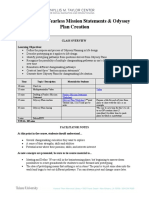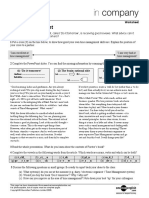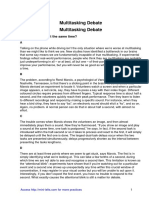Professional Documents
Culture Documents
Your Brain at Work
Your Brain at Work
Uploaded by
danielaOriginal Description:
Copyright
Available Formats
Share this document
Did you find this document useful?
Is this content inappropriate?
Report this DocumentCopyright:
Available Formats
Your Brain at Work
Your Brain at Work
Uploaded by
danielaCopyright:
Available Formats
Insights
from Your Brain at Work by David Rock
How well do you know your brain?
Can you explain what your brain is doing when you open up your laptop to work, open a textbook to study, or conduct a meeting?
In the book “Your Brain at Work” author David Rock uses the latest neuroscience to explain what your brain is doing while you work.
Rock says your mind is like a theater. The stage in your mental theater represents your short‐term working memory, and it's controlled by
your prefrontal cortex (the brain region just behind your forehead).
During the workday you can use your stage to perform five functions: understanding, recalling, memorizing, inhibiting, and deciding. To
remember these five functions, think of the acronym: U.R. M.In.D.
To perform these five functions, you need actors, audience members, and a stage director. Actors on stage represent objects, tasks, and
pieces of information you're focused on at any one moment. This sentence is currently an actor on your stage.
Audience members are maps of information in your long‐term memory. The audience is constantly trying to make sense of and associate
with actors on stage. Understanding, recalling, memorizing and deciding are made possible by the audience making associations to the
actors on stage.
The stage director is responsible for inhibiting unwanted actors from coming onto the stage and ruining a performance. These unwanted
actors are external distractions, like nearby conversations, and internal distractions, like afternoon food cravings.
3 Things You Must Know About Your Theater
Your Stage is Tiny Your Stage Has One Spotlight Your Director is Less Effective Later in
the Day
Recent research shows that the short‐ Your stage is illuminated by a single spotlight,
term working memory of the human and that spotlight can only focus on one actor at Over the course of a workday, hundreds
brain (your mental stage) can only a time. If two or more actors are trying to get of unwanted actors are trying to get on
fit four actors (four units of your attention, the light needs to rapidly stage and steal attention away from
information). Focusing on more than switch between those actors. Imagine watching important actors on stage.
four units of information at a time is a performance where two actors are talking at
impossible, unless you can find a way that same time, and a spotlight is rapidly Each time your director has to step in
to simply and chunk the information switching between those actors… That would be and hold back an unwanted actor,
(ex: create mental models or acronyms a terrible performance to watch! he/she loses a bit of energy.
for multiple units of information).
Author David Rock describes a study from the Eventually, your stage director becomes
Although you can fit up to four actors University of California at San Diego that too weak to stop unwanted actors from
on your stage at one time, "a study "showed when people do two cognitive tasks at walking on stage and ruining the
by Brian McElree at New York once, their cognitive capacity can drop from performance.
University found that the number of that of a Harvard MBA to that of an eight‐year‐
chunks of information you can old. It’s a phenomenon called dual‐task
remember accurately with no memory interference."
degradation is, remarkably, only one."
3 Ways to Deal with the Limitations of Your Mental Stage
When deciding among multiple Instead of rapidly switching your spotlight When your stage director is having a
options, limit the number of actors between two or more sources of information hard time keeping unwanted actors off
on stage by isolating two options at a (text messages, email messages, work project, the stage, start pushing cognitively
time. etc.), process the information in a serial demanding tasks on your to‐do list to
manner. Take a few moments to schedule the next morning (if possible).
If you 're deciding between five or tasks so you can give each task your undivided
more colors for a design, attention. If you need to plan a big project,
arrange head‐to‐head battles starting understand a complex subject, or make
with the first two colors. Isolate color If you want to complete three tasks in the next a major decision, do it in the first half
one and color two on the list and ask hour, set up a sequence of three 20‐minute of the day when your stage director
yourself, “Which of these two colors time blocks and assign each task to a separate can do a better job of keeping actors
improves the design?” Whichever time block. off stage.
color wins goes on to face the third
color on the list.
www.ProductivityGame.com
You might also like
- Solutions Problem Set 3 PDFDocument18 pagesSolutions Problem Set 3 PDFOsama SyedNoch keine Bewertungen
- HR DetailsDocument190 pagesHR DetailsMohit Yadav63% (8)
- Your Brain at Work David RockDocument1 pageYour Brain at Work David RockHoratiu BahneanNoch keine Bewertungen
- The Back of the Napkin (Review and Analysis of Roam's Book)From EverandThe Back of the Napkin (Review and Analysis of Roam's Book)Rating: 5 out of 5 stars5/5 (1)
- Landmark Newsletter: Creating The Life You Really WantDocument3 pagesLandmark Newsletter: Creating The Life You Really Wantolivkazolivek0% (1)
- What Affects ListeningDocument13 pagesWhat Affects ListeningSara YassinNoch keine Bewertungen
- Unplug 2Document23 pagesUnplug 2api-271553287Noch keine Bewertungen
- Educ202 Studentlearninganalysis sp17Document9 pagesEduc202 Studentlearninganalysis sp17api-407387301Noch keine Bewertungen
- Teach Yourself Programming in Ten YearsDocument7 pagesTeach Yourself Programming in Ten Yearsrohit_askme3948Noch keine Bewertungen
- Teach Yourself Programming in Ten YearsDocument6 pagesTeach Yourself Programming in Ten YearsAbuOuways Mouhamed Lamine BahNoch keine Bewertungen
- Teach Yourself Programming in Ten YearsDocument6 pagesTeach Yourself Programming in Ten YearsJimmy Pham Hoang NhatNoch keine Bewertungen
- Your Brain at Work (Review and Analysis of Rock's Book)From EverandYour Brain at Work (Review and Analysis of Rock's Book)Rating: 4 out of 5 stars4/5 (1)
- 25 Useful Brainstorming TechniquesDocument12 pages25 Useful Brainstorming TechniquesAlberto Adrián SchianoNoch keine Bewertungen
- TYL Class 03. Fearless Mission Statements + Odyssey Plan CreationDocument7 pagesTYL Class 03. Fearless Mission Statements + Odyssey Plan CreationAndrew SeguelNoch keine Bewertungen
- InterviewquestionsDocument8 pagesInterviewquestionsHellena LaNoch keine Bewertungen
- Profesionalisme Guru - Helping Students Generates Creative IdeasDocument63 pagesProfesionalisme Guru - Helping Students Generates Creative IdeassszmaNoch keine Bewertungen
- BTS Activity Pack Secondary School DramaDocument10 pagesBTS Activity Pack Secondary School Dramaj.p.degazioNoch keine Bewertungen
- Teaching Playwriting: A Mini-Unit: Lesson Plans and HandoutsDocument27 pagesTeaching Playwriting: A Mini-Unit: Lesson Plans and HandoutsNSaltineNoch keine Bewertungen
- Different Types of Pollution (Mind-Map)Document1 pageDifferent Types of Pollution (Mind-Map)matt conneryNoch keine Bewertungen
- Ieee Spectrum Article in EnglishDocument12 pagesIeee Spectrum Article in EnglishStevenson DavidNoch keine Bewertungen
- Mapping Your MindDocument13 pagesMapping Your MindsreenithijNoch keine Bewertungen
- Tools and ExplanationsDocument7 pagesTools and ExplanationsHsuMonKyawNoch keine Bewertungen
- Final Exam: We'll Stop Reading After 200 Words. Be ConciseDocument3 pagesFinal Exam: We'll Stop Reading After 200 Words. Be ConciseAlesya JanosiNoch keine Bewertungen
- Test For The Text "Time Travel Story" Name: - Total Marks: 20 Date: - Score ObtainedDocument9 pagesTest For The Text "Time Travel Story" Name: - Total Marks: 20 Date: - Score Obtainedamna naqviNoch keine Bewertungen
- Better Business Writing Skills - Resource PackDocument32 pagesBetter Business Writing Skills - Resource Packshubhamsharma2020Noch keine Bewertungen
- HSP ActivitiesDocument18 pagesHSP ActivitiesAr Hitesh ParmarNoch keine Bewertungen
- IcebreakersDocument10 pagesIcebreakersJardo de la PeñaNoch keine Bewertungen
- Teach Yourself Programming in Ten YearsDocument16 pagesTeach Yourself Programming in Ten YearsFiddle ThomasNoch keine Bewertungen
- ACTIVITY: Here Is The Quick and Simple Test (Simple Test For Dominant Learning Style) To FindDocument8 pagesACTIVITY: Here Is The Quick and Simple Test (Simple Test For Dominant Learning Style) To Findkaren grace salatan100% (1)
- PGXPM-DT - DTC - Step 8 - Brainstorm IdeasDocument5 pagesPGXPM-DT - DTC - Step 8 - Brainstorm IdeasRajan13579Noch keine Bewertungen
- How To Explain Object-Oriented Programming Concepts To A 6-Year-OldDocument7 pagesHow To Explain Object-Oriented Programming Concepts To A 6-Year-OldmohitNoch keine Bewertungen
- Assignment 1 09Document4 pagesAssignment 1 09Ephreen Grace MartyNoch keine Bewertungen
- A Research Report On What You Plan To Work On As A Semester ProjectDocument2 pagesA Research Report On What You Plan To Work On As A Semester ProjectsafowanNoch keine Bewertungen
- Clean Coder: CommitmentsDocument4 pagesClean Coder: CommitmentsVipin SharmaNoch keine Bewertungen
- Professional Development Jack EwinsDocument8 pagesProfessional Development Jack Ewinsapi-630381870Noch keine Bewertungen
- WK 2 Four Types of Thinking StyleDocument5 pagesWK 2 Four Types of Thinking StyleBrooke TillmanNoch keine Bewertungen
- WK 2 Four Types of Thinking StyleDocument5 pagesWK 2 Four Types of Thinking StylePsychologyEnergyNoch keine Bewertungen
- IC0162S.time ManagementDocument1 pageIC0162S.time ManagementAnna MusińskaNoch keine Bewertungen
- Management and Innovation in The Mathematics ClassroomDocument23 pagesManagement and Innovation in The Mathematics ClassroomClara GallartNoch keine Bewertungen
- MOST IMORTANT FILE - From Purdue UniversityDocument503 pagesMOST IMORTANT FILE - From Purdue UniversityAhmed Mahmoud AbouzaidNoch keine Bewertungen
- Content Analysis: Applications and ImagesDocument26 pagesContent Analysis: Applications and ImagesTerry College of BusinessNoch keine Bewertungen
- (A) 寫作前準備 (Prewriting) : 1. 第一課 BrainstormingDocument42 pages(A) 寫作前準備 (Prewriting) : 1. 第一課 BrainstormingAlva WongNoch keine Bewertungen
- Multitasking DebateDocument6 pagesMultitasking DebateBaoan 1214Noch keine Bewertungen
- Professional Development Sheet 2Document7 pagesProfessional Development Sheet 2api-629636212Noch keine Bewertungen
- Chapter 6 - Tools of Creative ThinkingDocument46 pagesChapter 6 - Tools of Creative ThinkingLalita A/P AnbarasenNoch keine Bewertungen
- Blake and Mouton Leadership QuestionerDocument5 pagesBlake and Mouton Leadership QuestionerSerdadu KoplokNoch keine Bewertungen
- Concept Pro Forma ExplainedDocument5 pagesConcept Pro Forma ExplainedhornseymNoch keine Bewertungen
- Professional Development Sheet Mine 2Document8 pagesProfessional Development Sheet Mine 2api-629647005Noch keine Bewertungen
- Professional Development Sheet Mine 2Document8 pagesProfessional Development Sheet Mine 2api-632599674Noch keine Bewertungen
- AP Psychology Brain Project: Unit 3: Biological Bases of BehaviorDocument2 pagesAP Psychology Brain Project: Unit 3: Biological Bases of BehaviorCaterra ParkerNoch keine Bewertungen
- Creative Thinking Enhancement Skills Using Mind Mapping TechniquesFrom EverandCreative Thinking Enhancement Skills Using Mind Mapping TechniquesNoch keine Bewertungen
- 01 IntroductionDocument64 pages01 IntroductionyatoabestaNoch keine Bewertungen
- Documental Producing 1Document3 pagesDocumental Producing 1deo_crNoch keine Bewertungen
- Joshua Hanson FepproposalDocument6 pagesJoshua Hanson Fepproposalapi-612854804Noch keine Bewertungen
- SHS Academic Reading and Writing Week 3Document14 pagesSHS Academic Reading and Writing Week 3Sir Ryan ZNoch keine Bewertungen
- First QuestionDocument2 pagesFirst QuestionAbdullah JuttNoch keine Bewertungen
- Comski 2 - Day 5Document48 pagesComski 2 - Day 5DhoyetNoch keine Bewertungen
- Flynn Rochford - Professional Dev Sheet 2Document8 pagesFlynn Rochford - Professional Dev Sheet 2api-629647051Noch keine Bewertungen
- Know Your Audience by Practicing Empathy.: ObjectiveDocument3 pagesKnow Your Audience by Practicing Empathy.: ObjectiveRams MasdNoch keine Bewertungen
- Insights From Sprint by Jake Knapp, John Zeratsky & Braden KowitzDocument1 pageInsights From Sprint by Jake Knapp, John Zeratsky & Braden Kowitzrhys hridNoch keine Bewertungen
- Sprint PDFDocument1 pageSprint PDFMickaël BelakNoch keine Bewertungen
- SprintDocument1 pageSprintPeter EmeraldNoch keine Bewertungen
- Engleza Fara ProfessorDocument159 pagesEngleza Fara ProfessordanielaNoch keine Bewertungen
- Brighter Grammar 2Document48 pagesBrighter Grammar 2daniela100% (1)
- Leadership Emotional IntelligenceDocument1 pageLeadership Emotional IntelligencedanielaNoch keine Bewertungen
- How To Be More Efficient at WorkDocument6 pagesHow To Be More Efficient at WorkdanielaNoch keine Bewertungen
- Leadership 80/20 RuleDocument3 pagesLeadership 80/20 RuledanielaNoch keine Bewertungen
- LeadershipDocument1 pageLeadershipdanielaNoch keine Bewertungen
- Horse Coloring Page Flower FrameDocument1 pageHorse Coloring Page Flower FramedanielaNoch keine Bewertungen
- Wild HorseDocument1 pageWild HorsedanielaNoch keine Bewertungen
- Rekabentuk JambatanDocument42 pagesRekabentuk JambatanAlsonChinNoch keine Bewertungen
- USA USED Car Dealers 2Document171 pagesUSA USED Car Dealers 2mian saifNoch keine Bewertungen
- Peralatan Kesehatan Berbasis Software Di RSJ Dr. Radjiman Wediodiningrat LawangDocument10 pagesPeralatan Kesehatan Berbasis Software Di RSJ Dr. Radjiman Wediodiningrat LawangMuhammad RazieNoch keine Bewertungen
- Is 7215Document24 pagesIs 7215kalpana100% (1)
- RAEC Capability Final PDFDocument0 pagesRAEC Capability Final PDFkggganiNoch keine Bewertungen
- Career Development PlanDocument9 pagesCareer Development PlanRabia GulNoch keine Bewertungen
- 58 TD 117 Cutting Wheel Selection r1 1Document4 pages58 TD 117 Cutting Wheel Selection r1 1Admir HalilovicNoch keine Bewertungen
- Assignment 1 HTT170Document43 pagesAssignment 1 HTT170NIK NUR ALEYLIYANA NABILAH ZULKARNAINNoch keine Bewertungen
- Curriculum Guide Ay 2021-2022: Dr. Gloria Lacson Foundation Colleges, IncDocument9 pagesCurriculum Guide Ay 2021-2022: Dr. Gloria Lacson Foundation Colleges, IncJean Marie Itang GarciaNoch keine Bewertungen
- Palimpsest Vol Vi No 11 2021Document312 pagesPalimpsest Vol Vi No 11 2021Palimpsest / ПалимпсестNoch keine Bewertungen
- Text Why Is Emotional Intelligence Important For TeensDocument2 pagesText Why Is Emotional Intelligence Important For Teensno nameNoch keine Bewertungen
- 12 - HUMSS and STEM Ne Edit Na TotooDocument10 pages12 - HUMSS and STEM Ne Edit Na TotooFreya GandaNoch keine Bewertungen
- Kyanna Alexies R. Bunayog: Blk.3 Lot.8 Guinto St. Guinto Park Subd - Pulanlupa DosDocument3 pagesKyanna Alexies R. Bunayog: Blk.3 Lot.8 Guinto St. Guinto Park Subd - Pulanlupa DosKyanna BunayogNoch keine Bewertungen
- Analysis - BEx Web Application Designer - SAP LibraryDocument9 pagesAnalysis - BEx Web Application Designer - SAP LibrarysudhNoch keine Bewertungen
- SAAO As of January 31, 2011Document73 pagesSAAO As of January 31, 2011Budget Department - GenSan LGUNoch keine Bewertungen
- Leadership PDFDocument6 pagesLeadership PDFbjhbfjhNoch keine Bewertungen
- Labview Real-Time 2 Course Manual: SampleDocument17 pagesLabview Real-Time 2 Course Manual: Sampleanubhav yadavNoch keine Bewertungen
- CVALEJANDROMartin Del Campo MorenoDocument3 pagesCVALEJANDROMartin Del Campo MorenoSoluciones Capital HumanoNoch keine Bewertungen
- Margin Press Test AdjustDocument8 pagesMargin Press Test AdjustDidi PrawiraNoch keine Bewertungen
- Tech Specs: 8channel TemperaturescannerDocument2 pagesTech Specs: 8channel Temperaturescannermukul9040Noch keine Bewertungen
- Curriculum Vitae: Sajal SamantaDocument4 pagesCurriculum Vitae: Sajal SamantabhaskarNoch keine Bewertungen
- Slac 5 - Training Design-Lrcp - Item AnalysisDocument3 pagesSlac 5 - Training Design-Lrcp - Item AnalysisPaciano Padao DexieNoch keine Bewertungen
- Surat Integrated Transport: Towards Smarter MobilityDocument14 pagesSurat Integrated Transport: Towards Smarter MobilitysaketNoch keine Bewertungen
- MSC.1-Circ.997 - Guidance On The Preparation and Review of IndependentEvaluations Required by STCW Regulati... (Secretariat)Document5 pagesMSC.1-Circ.997 - Guidance On The Preparation and Review of IndependentEvaluations Required by STCW Regulati... (Secretariat)K.l. DhanaNoch keine Bewertungen
- Environmental and Health Effects of European Contact With The New WorldDocument2 pagesEnvironmental and Health Effects of European Contact With The New WorldMargaux TaufourNoch keine Bewertungen
- 3M PSD Active Hearing Catalogue (LR)Document52 pages3M PSD Active Hearing Catalogue (LR)David BaylissNoch keine Bewertungen
- CATALOGO Vulcraft DeckcatDocument100 pagesCATALOGO Vulcraft DeckcatRicardo Jesus Mallma Cubas100% (1)
- JohannesTownsendFerris 13 1Document24 pagesJohannesTownsendFerris 13 1Hemant100% (1)

































































































